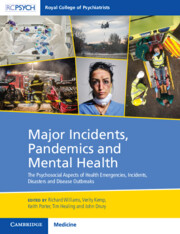 Major Incidents, Pandemics and Mental Health
Major Incidents, Pandemics and Mental Health from Section 4 - Responses to Meet the Mental Health Needs of People Affected by Emergencies, Major Incidents, and Pandemics
Published online by Cambridge University Press: 11 January 2024
On 13 November 2015, a series of terrorist attacks occurred in the Paris area. In total, 130 people were killed, 643 people were physically injured, and several thousand were psychosocially affected. Thousands of first responders were mobilised that night and during the subsequent weeks. This chapter presents a summary of the ESPA survey launched by Santé Publique France 8 to 11 months after the attacks in order to measure the traumatic impact and the use of mental health supports by people whose exposure met criterion A of the Diagnostic and Statistical Manual of Mental Disorders, Fifth Edition (DSM-5) definition of post-traumatic stress disorder (PTSD). This chapter provides two examples of the analysis and results that can be generated from the database.
To save this book to your Kindle, first ensure [email protected] is added to your Approved Personal Document E-mail List under your Personal Document Settings on the Manage Your Content and Devices page of your Amazon account. Then enter the ‘name’ part of your Kindle email address below. Find out more about saving to your Kindle.
Note you can select to save to either the @free.kindle.com or @kindle.com variations. ‘@free.kindle.com’ emails are free but can only be saved to your device when it is connected to wi-fi. ‘@kindle.com’ emails can be delivered even when you are not connected to wi-fi, but note that service fees apply.
Find out more about the Kindle Personal Document Service.
To save content items to your account, please confirm that you agree to abide by our usage policies. If this is the first time you use this feature, you will be asked to authorise Cambridge Core to connect with your account. Find out more about saving content to Dropbox.
To save content items to your account, please confirm that you agree to abide by our usage policies. If this is the first time you use this feature, you will be asked to authorise Cambridge Core to connect with your account. Find out more about saving content to Google Drive.